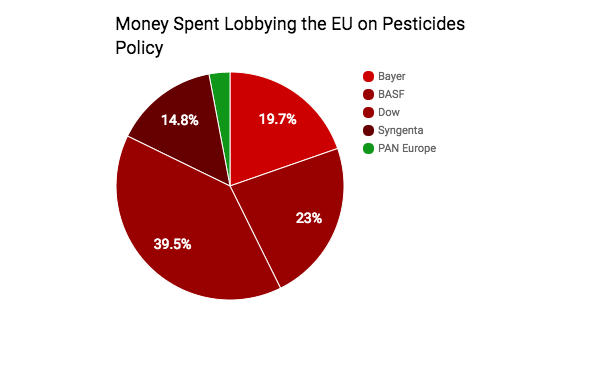Today, the European Crop Protection Association (ECPA) has organised a conference in the European Parliament on the importance of pesticides in EU agriculture. The fallacious century-old “we need to feed the world” argument is still regularly claimed by the pesticide industry to support a model that is a dead end: low-efficiency, high health costs, low employment rate, high environmental impacts. The real inconvenient truth is the conventional agriculture model has failed in Europe. Farmers are suffering: low incomes, health problems and more and more farms disappearing. It is time to stop scaring people with invented figures (85% yield losses if the most toxic are banned) heard today. A different and much more positive approach exists: Integrated Pest Management (IPM).
ECPA has served us today a lunch of arguments on “Another Inconvenient Truth: The Role of Pesticides in European Agriculture and Productivity”. The inconvenient truth comes from the pesticide industry. A glance at the EU transparency directory reveals that just for 2015, Bayer has spent 1.99 million euros for lobbying to make EU decision-makers believe their pesticides are safe and necessary. BASF spent at least 2.33 million while Dow spent nearly 4 million euro and Syngenta 1.5 million euros. In total, for these major pesticide companies, nearly 10 million euros are spent annually in Brussels to lobby in favour of the use of pesticides. As a comparison, Pesticide Action Network Europe which is seen as one of the major players to counterbalance pesticide companies in the EU arena has only a 133 000€ budget dedicated to lobbying.

Another inconvenient truth: ECPA states that the availability of pesticides is limited for farmers. In reality in the last few years, the number of authorised active substances in the EU has increased from 200 to 496 active substances today. The number of pesticides we encounter every day in our food and in the environment is increasing, contrary to what ECPA tries to make people believe.
Another inconvenient truth according to ECPA: ‘pesticides use provides higher yields and incomes’. Making the link between yields and income is more than misleading and is one of the reasons the financial situation of farmers is so bad. Competing for yields in conventional agriculture means: high costs for human health, high costs for the environment and high costs and low profitability for farmers. On the contrary, data support that applying real integrated pest management (pesticides used only after putting in place all the alternatives) is the way to provide high yields, strong profits and a thriving environment.
One more inconvenient truth is that pesticide companies are merging (Monsanto + Bayer, Syngenta + ChemChina, DuPont + Dow), becoming industrial monsters that will impede the publication of the statistics on the sales and uses of pesticides in Europe, hiding behind the argument of ‘confidential commercial information’. In the meantime, EU citizens have no right nor ability to know how many tonnes of pesticides are sprayed in their environment and what the trend for pesticides uses is. In a recent request for information made by PAN Europe to the European Commission, only 11 out of 28 member states agreed to provide us the statistics of sales because it would supposedly harm companies’ business.
François Veillerette, PAN Europe’s president said : ‘It is now time EU agriculture turns to sustainable practices and include more agronomy in farms, making a real integrated pest management where pesticides use is an exception and putting agronomy at the centre of the farm. Farmers are suffering in Europe of lack of profitability. Expensive pesticides and fertilizers are part of the problem, not a solution. It is time for a paradigm change: more and more publications show that making use of crop rotation or cover crops significantly increases crop yields and strongly reduces pest damages, hence reducing our dependency on pesticides. Today, many tools are available to pursue a model of agriculture in which farmers make a comfortable living out of their activity, producing high quality pesticide-free food.’
Contacts: PAN Europe, martin [at] pan-europe.info: +32 (0) 486 32 99 92
